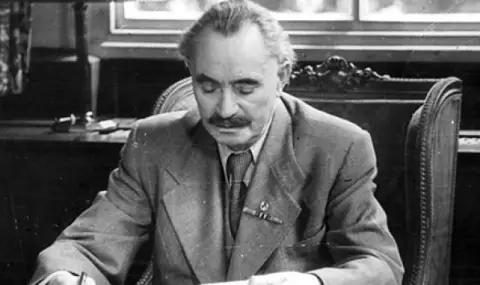On July 8, 1947, the government of Georgi Dimitrov categorically refuses American financial support for " ;The Marshall Plan" to rebuild Europe. We remind you that 16 Western European countries benefit from it, which these days attract Bulgarians as a destination for study, work, life or tourism.
On July 8, 1947, Georgi Dimitrov showed that
Stalin's interests in the Balkans are above those of Bulgaria.
This is no accident. After the 1933 Reichstag arson trial, Georgi Dimitrov immigrated to the USSR. There he has a dizzying career. He became the leader of the Comintern. Over the next decade, in closest collaboration with Soviet dictator Joseph Stalin, he played a central role in coordinating the world communist movement. He was also a deputy in the Soviet Parliament in the period 1938 – 1945 year.
Georgi Dimitrov returned to Bulgaria on September 15, 1946.
Immediately after his return, he suffered a defeat in the parliamentary elections against Atanas Moskov - a candidate from the Bulgarian Labor Social Democratic Party. He was elected Prime Minister in November 1946. He heads the BRP (k), which in December 1948 was renamed BKP.
For this reason, Georgi Dimitrov follows
Stalin's line of opposition to the "Marshall Plan".
The initiative was named after the US Secretary of State at the time, George Marshall.
The American government gave a grant of then 13 billion dollars to rebuild the European economy after the end of the Second World War.
The plan was in effect for 4 years from April 8, 1948. The goal of the United States was to rebuild war-torn areas, remove trade barriers, modernize industry, and restore economic prosperity to Europe as a barrier to the spread of communism. Part of the plan is also to eliminate many regulations and promote productivity growth.
It is obvious to the administration in Washington that it is in no one's interest to allow the collapse of an essential part of the world economy and trade, which is Europe. In addition
ruined and distressed, Europe would become an easy victim of communist propaganda and Soviet political advance.
The main condition for receiving American financial aid is that governments present their projects for economic recovery and report exactly how they are implemented and in which sectors the allocated funds are invested. It has been noted that regimes that violently attempt to remain permanently in power or impede the free recovery and development of other countries will not be supported.
Soviet diplomacy is opposed because it does not want the financial aid to prevent the beginning of the construction of a totalitarian system of the Stalinist type in the Eastern European countries and the binding of their economies to the Soviet one.
To implement the American proposal, the French and British governments decided to hold an international conference with the participation of the European countries interested in external financial assistance, at which a common program for post-war reconstruction would be drawn up.
On July 1, 1947, the official Soviet position was published, which is categorically against.
Four days after being officially invited, on July 8, 1947, the Bulgarian side refused to participate. From Eastern Europe, only Czechoslovakia initially accepted, but under pressure and promises from the USSR also refused.
